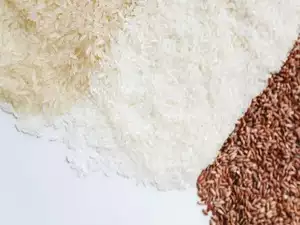Tags
India’s easing of rice exports welcomed in S Africa
Synopsis
South African importers and consumers have expressed relief as India withdraws its ban on non-basmati white rice exports, imposing a floor price of USD 490 per tonne. The eased restrictions are expected to stabilize global rice prices and meet South Africa’s annual demand of 10 million tonnes.

South African importers have welcomed India’s decision to ease restrictions on rice exports. Last month, the Indian government withdrew a blanket ban on overseas shipments of non-basmati white rice. It imposed a floor price of USD 490 per tonne and exempted the commodity from export duty.
Exports of non-basmati white rice were banned from July 20, 2023, to boost domestic supply.
“It’s welcoming news for all the importers like us, as South Africa imports roughly 10 million tonnes of rice every year. After Thailand and Vietnam, which account for 70 per cent of imports of rice in South Africa, India is the next biggest exporter of rice to South Africa,” said Pranav Thakkar of Dev International, one of the largest importers of Indian products to South Africa.
“This will increase India’s exports and cater for the demands and needs of southern African countries. As soon as the news came in, we already have put in our orders, and containers are on their way,” he added.
Thakkar said the lifting of the ban on exporting short-grain rice and white rice impacted global markets, with prices already beginning to decline.”This will coincide with new harvesting crops of paddy (rice) from October /November in India,” he said.
Thakkar said short-grain white rice is sold in South African markets for the masses and re-exported to neighbouring countries.
He said the prices of India-specific rice types, which had touched the higher prices of basmati rice from last year, will now descend to normal after the ban’s lifting.
Wandile Sihlobo, Chief Economist at the South African Agricultural Business Chamber, echoed these sentiments.
“Global rice prices have softened notably in recent weeks because of expected ample global supplies. The news that India is likely to ease rice export restrictions as supply increases and that its elections have concluded has perhaps also helped,” Sihlobo said.
“India placed a ban on non-basmati white and broken rice. This category typically accounted for 45 per cent of the 22 million tonnes of rice that India exports to the global market annually,” Sihlobo said.
In the months following the official announcement on July 20, 2023, global rice prices surged due to widespread concerns about potential supply shortages.
“The worries were not misplaced. India accounts for roughly 26 per cent of global rice production. Fortunately, there was a quick adjustment of supply chains, and the world did not face a major rice shortage,” Sihlobo said.
He said South Africa imports 100 per cent of its rice needs of about a million tonnes annually because its climate does not allow local rice production.
Restaurant owners specialising in Indian cuisine, along with consumers, have welcomed the news that rice prices are expected to ease.
“More customers prefer rice with their curries than roti or naan, so our costs have indeed gone up recently because of rice,” said Mehmood Latif, who runs the Desi Khana restaurant in south Johannesburg.
At Shama’s, one of the largest retailers of Indian food and spices in Johannesburg, housewife Anita Singh said the difficult economic climate faced by the public led to her using less rice and more rotis in recent months because of the increased costs involved.
“But you can’t escape using rice for the weekly biryanis at home, so this coming price drop is good news,” she said.
https://economictimes.indiatimes.com/news/economy/foreign-trade/indias-easing-of-rice-exports-welcomed-in-s-africa/articleshow/113987706.cms?from=mdrPublished Date: October 6, 2024







